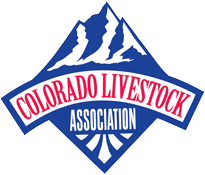Animal Identification
What is CLA’s Policy on Mandatory Brand Inspection?
CLA supports an effective, permanent, and mandatory animal identification program that is technology-neutral and that is developed by industry partners who agree on an acceptable plan that can be implemented in the most cost-efficient manner that does not limit, inhibit, or prevent commerce and is uniformly accepted and eliminates variation from state to state.
Colorado State Board of Stock Inspection
The Brand Board’s responsibilities are to consult with and advise the Commissioner of Ag in appointing a brand commissioner who shall be under the Board’s supervision and carry out its policies, and to make such rules and regulations not inconsistent with law concerning the inspection of brands and livestock as it deems proper.
Fast Facts about the Colorado Brand Inspection Division
- Formed by the livestock industry in approximately 1865, when Colorado was still just a territory.
- Became a state agency in 1903 and a division of the Department of Agriculture in the early 1970s.
- There are 63* full-time and part-time brand inspectors and supervisors.
- Livestock agents inspect over 4.5 million head of cattle annually.
- There are 24* participants in the Certified Feedlot Program.
- There are more than 30,000* registered brands.
*As of September 2023.
For more information visit https://ag.colorado.gov/brands/livestock-inspection.
Animal Disease Traceability
CLA is working in concert with state and federal officials on response planning and preparedness. CLA was a stakeholder in the passage of legislation in 2023 that would aid in this effort to reduce the spread of outbreaks or greater losses due to the sudden onset of infectious disease. Animal disease traceability does not prevent disease, but it can provide vital information that helps producers, veterinarians, and state and federal officials respond rapidly and effectively during an animal disease outbreak:
- Reduce the number of animals involved
- Streamline response times
- Safeguard the food supply chain
- Allow unaffected producers to keep running their businesses safely
BACKGROUND
The Animal Disease Traceability (ADT) Rule was enacted in January 2013 to require animals to be identified and accompanied by an Interstate Certificate of Veterinary Inspection (ICVI) or other movement document when crossing state lines. In September 2021, USDA published the APHIS rules enhancing traceability, which includes electronic identification tags (RFID) for some animals and increased data-sharing. CLA’s goals align with USDA’s long-term strategy on this issue.
Livestock Emergency Management
It is vital to prepare for, control, and mitigate livestock disease outbreaks. The Colorado Department of Agriculture’s Animal Health Division’s preparedness and response plans for the different livestock sectors are great tools for producers to use to create farm-specific plans in the event of a disease outbreak.
View helpful resources from the Colorado Department of Agriculture.
What is CLA’s Policy on Country-of-Origin Labeling (MCOOL)?
The CLA Board of Directors adopted the following policy on October 6, 2020, regarding Country-of-Origin Labeling:
WHEREAS, there is recognition about the many adverse aspects of Country-of-Origin Labeling including the costs, benefits, and impact of Country-of-Origin Labeling relative to tracking, auditing, verification, and compliance, and
WHEREAS, CLA opposes mandatory labeling but remains in support of Country-of-Origin Labeling that is voluntary and industry-driven, and
WHEREAS, the World Trade Organization declared the implementation of the previous mandatory Country-of-Origin Labeling law to be in violation of international trade laws, subjecting the United States to severe retaliatory tariffs unless it was repealed, and
THEREFORE BE IT RESOLVED, CLA shall continue to oppose mandatory Country-of-Origin Labeling laws or regulations that may violate international trade laws, and will continue to support voluntary Country-of-Origin Labeling laws or regulations for red meat products that allow maximum benefits and minimal market disruptions.
